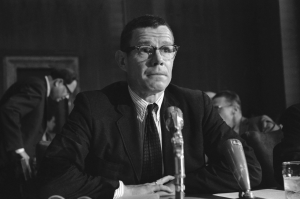
(Grimes, 2016)
For the historical analysis section, Schelling, Cohn, Walzer, Mack, and Hammes were useful to our argument about the importance of learning from mistakes the US has made. Schelling’s ideas on the strategic logic were used when discussing the strategic logic behind bombing Hiroshima and Nagasaki. Schelling argues that politics drives military action and he differentiates between the direct use of force and the indirect use of force: with the direct use of force, the purpose is to destroy a physical target, while the indirect use of force’s purpose is to send a message. According to Schelling, the bombing of Hiroshima and Nagasaki was the indirect use of force, where the purpose was to send a message to Tokyo. Additionally, part of Cohn’s arguments was used when discussing how leaders justify using nuclear weapons. She argues that the people that justify the use of nuclear weapons do not bear the brunt of the human suffering that comes from them. This argument was used when discussing the Damascus Incident, as government officials are often so focused on developing nuclear weapons, that it is easy to overlook the consequences or accidents that occur with such dangerous material. Further, Walzer’s arguments about “Just War” and the“usefulness of morality” were relevant to US military aggression in the Vietnam war. Walzer argues that states will be undermined if they act unjustly in war, especially since the media puts the spotlight on immoral acts. Therefore, Walzer’s ideas were relevant to US strategy in Vietnam, which relied on technology and ultimately overlooked the human aspect of war. Additionally, Mack’s thoughts on unconventional warfare being key to success was relevant to the discussion on the US’ conventional strategy during Vietnam. Mack argued that the key to winning a war is by attacking the will of the adversary rather than relying on superior weapons and brute force. The Vietnam War serves as an example of Mack’s argument where military superiority was not key to success. Lastly, Hammes was useful in discussing the Vietnam War, as he emphasizes the strategy of 4th Generation Warfare and explains why the US lost in Vietnam.
For the counterargument section, Broad, Byman, Lazer, Polyakova, Singer, and Stern were useful in determining the opposing argument. William Broad, of the New York Times, illuminated some of the ambiguity that surrounds the Stuxnet virus that plagued Iran’s nuclear centrifuges. Daniel Byman, a proponent of drone warfare, makes many claims regarding how the use of drones can alter and be beneficial for U.S. strategy abroad. David Lazer writes on how fake news, propagated by tech companies like Facebook, has affected the U.S. political landscape. Outside forces meddling in U.S. elections, via fake news, is a grave security threat. Alina Polyakova’s paper further highlights this threat posed by cyber interference in U.S. political practices. She speaks to how failed U.S. responses empower other foreign entities which leads to an even greater security threat. W.P. Singer, in his article on cyberspace, argues for how interconnected the world has become since the proliferation of internet connections and web data. This interconnectedness poses a security risk for nations that are dependent on the internet and web services. Finally, Jeffrey Stern describes the accuracy of cyber weapons. His argument primarily frames the problems with precision bombs, but in the context of this website, his point about how accurate the weapons are is useful in discussing advanced weaponry and how it might be used to increase international security.

(Nagl, 2009)
The Policy Suggestion section was influenced by the work of John A. Nagl. Nagl’s article, “Let’s Win the Wars We’re In,” highlights the US military’s strategic shortcomings in irregular conflicts in the past and present. Our group’s main argument is in alignment with Nagl’s positionality, that to make informed decisions in present and future military operations it’s vital to look at history for guidance. Nagl’s response to critics who disapprove of the investment of COIN operations is: historically, the US has been involved in more “COIN and nation building missions than full-scale war” and that “trends such as the youth bulge and urbanization in underdeveloped states, as well as the proliferation of more lethal weaponry, point to a future dominated by chaotic local insecurity conflict rather than confrontations between the armies and navies of nation-states.” Therefore, implementing COIN strategies will serve the military in the future. Nagl also counters critics’ claims by expressing another flaw in the US military which is prioritizing the hypothetical future “big war” conflicts rather than addressing the present irregular conflicts. Neglecting current conflicts will only prolong them; therefore, increasing the time, money, and lives spent on the present issues.
